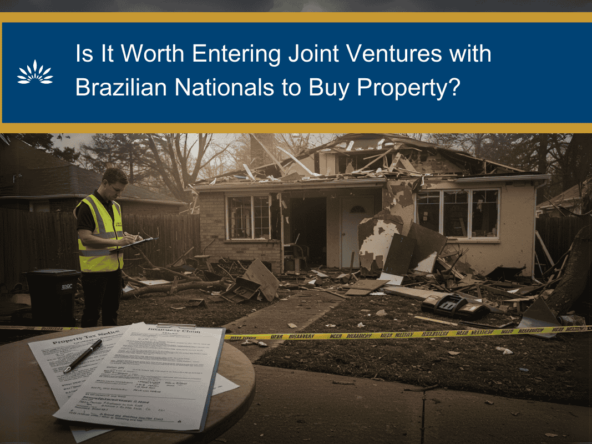Notary Public in Brazil: Why It Matters for Your Property Purchase
Planning to buy property in Brazil? Learn how notary public services validate your documents, safeguard your ownership, and streamline the buying process. Let’s dive into essential steps!
Notary Public: Understanding Their Essential Role in a Brazilian Property Purchase
Picture yourself sipping coffee in a vibrant São Paulo café, listening to two friends discuss how best to invest in real estate in Brazil. One friend describes a charming beachside condo that’s on the market, while the other highlights the importance of hiring the right real estate professionals—like real estate agents and lawyers—to avoid legal pitfalls. Suddenly, someone in the group asks, “What is a Notary Public and why do we need one?” The question lingers, as it’s surprisingly common to wonder how this figure fits into real estate deals in the Brazilian real estate market.

In Brazil, real estate transactions hinge on thorough documentation and official validation to protect all parties. Buying or selling any property, whether it’s a luxury penthouse in Rio or farmland in Minas Gerais, requires more than just a handshake and the exchange of keys. At the center of this process stand notary public services, which confirm the authenticity of documents, secure registration in public records, and ensure each deal adheres to the real estate system in Brazil.
By the time you reach the end of this guide, you’ll understand precisely what is a notary public and why their presence is so significant when you’re about to invest in real estate. You’ll also see how these professionals align with real estate agents and lawyers to keep the Brazilian real estate market transparent and legally sound. Whether you’re purchasing your dream home, looking for a vacation rental income property, or exploring commercial opportunities, understanding legal notary requirements is indispensable. So let’s dive in and unravel the essential role of a notary public in real estate in Brazil.
The Importance of a Public Notary in the Brazilian Real Estate Market
You may already appreciate how dynamic the Brazilian real estate market can be: bustling city apartments, serene coastal getaways, and everything in between. Meanwhile, Brazilian law strives to make sure that real estate deals remain safe and transparent. Here’s where notary public services step in as guardians of legality, providing an impartial verification process essential to a stable real estate system.
Ensuring Legal Integrity: By verifying signatures, documents, and IDs, a public notary keeps fraud at bay. This is crucial if you’re set to invest in real estate in a foreign country and want to avoid any hidden legal battles later.
Binding Agreements: Once a notary records your deed in public records, your ownership becomes formally recognized. You won’t have to worry about another party contesting your rights because everything has official, legal backing.
Consumer Protection: Brazilian law is particularly detailed when it comes to safeguarding property buyers and sellers. By relying on legal notary procedures, individuals avoid the pitfalls of skipping critical steps in real estate transactions.
In essence, the notary’s role is to reassure you that each part of your real estate deals checks out from a legal standpoint. Whether you’re a resident or foreign national, these services can translate into peace of mind during and after the purchase.
What Is a Notary Public and How Do They Differ from Other Real Estate Professionals?
The question “What is a Notary Public?” often arises when people first enter the world of real estate in Brazil. A public notary (or legal notary) is a neutral, government-authorized official who verifies the authenticity of documents, confirms identities, and records essential real estate transactions. They essentially function as impartial gatekeepers, preventing fraudulent activity and ensuring legal compliance.
Notary Public vs. Real Estate Agents
Real Estate Agents: These professionals specialize in helping clients buy or sell properties. They can guide you through market prices, negotiation tactics, and listing strategies, but they don’t hold the government-delegated power to officially authenticate or register your purchase.
Public Notary: Focuses on legal verification and official registration. They’re not in charge of marketing or property valuations but are the ones to finalize and register your sale in public records.
Notary Public vs. Lawyers
Lawyers: Offer legal advice, draft contracts, represent you in disputes, and handle due diligence. You can contact
Oliveira Lawyers to learn more about these services.
Public Notary: Oversees the official process of transferring ownership, which includes ensuring that the documents comply with local and federal regulations. While they can clarify legal terms, they do not represent any party’s personal interests.
From start to finish, your real estate deals benefit from having both an attorney and a public notary. One ensures your best interests are protected, and the other guarantees legal validity and official recognition by the real estate system.
The Core Responsibilities of Notary Public Services
In the Brazilian real estate market, notary public services serve as a cornerstone of legitimate property transfers. These responsibilities go well beyond stamping documents. Here are their key tasks:
Document Authentication: A public notary checks the document’s legitimacy, ensuring no pages are missing or altered. If you plan to invest in real estate in Brazil, this step provides the certainty that you’re getting a clear and accurate agreement.
Identity Verification: Dealing with false identities or imposters is a real risk. The legal notary requires valid identification, a CPF, and sometimes additional documents to confirm all parties. This minimizes identity fraud, which could otherwise jeopardize your ownership.
Ensuring Understanding: A reputable public notary strives to confirm that each party understands every clause in the contract. If any language barriers exist, translators or interpreters might be required.
Registering Transactions in Public Records: After the notary finalizes the paperwork, the transaction must be logged in public records. This step cements your new ownership status and makes the deal official.
The Step-by-Step Process: Real Estate Transactions in Brazil
To understand how notary public services fit into property transfers, it helps to look at a typical sequence of events:
Step 1: Finding the Property
Begin by connecting with reputable real estate agents who know the region’s market dynamics. Look for professionals familiar with local property values, legal intricacies, and the best neighborhoods.
Step 2: Offer and Negotiation
Once you identify a property, you’ll negotiate the price and terms with the seller. Depending on how complex the agreement is, you might hire a lawyer to draw up a preliminary contract.
Step 3: Due Diligence
Engaging a lawyer is especially important here to ensure there are no outstanding liens, lawsuits, or other surprises tied to the property. This stage verifies the seller’s legal ownership.
Step 4: Choosing Your Public Notary
Brazil has numerous notary offices (cartórios de notas). Ask your real estate agents or attorney for recommendations. When you select one, you’ll schedule a date to sign the final deed.
Step 5: Signing the Public Deed
At this stage, the notary public services step into the spotlight. You, the seller, and possibly your lawyer meet at the notary’s office. The legal notary checks everyone’s IDs, confirms each signature, and ensures that everyone understands the document.
Step 6: Official Registration
Finally, the notary enters the transaction into public records. This step makes your ownership official. Without a valid registration, you risk losing many legal protections and could face complications in future real estate deals.
Comparison Table: Public Notary vs. Lawyer vs. Real Estate Agent
| Aspect | Public Notary | Lawyer | Real Estate Agents |
|---|---|---|---|
| Primary Function | Offers notary public services, validates documents, ensures legal compliance, and records the purchase in public records. | Provides legal advice, drafts contracts, manages disputes, and protects clients’ interests (Oliveira Lawyers). | Guides buyers and sellers, arranges property showings, researches market data, and negotiates deals. |
| Authority and Regulation | Appointed by the government to certify signings, keep impartiality, and uphold local laws in the Brazilian real estate market. | Licensed by Brazil’s Bar Association (OAB), works as a personal advocate for clients. | Accredited by CRECI, specialized in local property markets, not legally authorized to validate or register documents. |
| Documentation Duties | Verifies ID and documents, confirms no fraud, and updates the real estate system with new ownership details. | Checks for hidden legal issues, drafts and reviews contracts, and addresses potential liabilities. | Lists properties, provides market assessments, organizes visits, and handles buyer-seller communications. |
| Official Registration | Registers the final deed in public records, making the new ownership legally binding. | Not responsible for official registration, but can help ensure all documents meet legal prerequisites. | Hands over the transaction to the notary or lawyer for finalization; no authority to register deals. |
| Payment Structure | Fees vary by region and property value; usually charges a percentage or standard service fee. | Charges hourly rates or a flat fee, depending on the scope of work. | Typically receives a commission from the sale price or as agreed upon in the listing contract. |
| Impartiality Level | Acts as a neutral party; cannot offer biased advice to either side. | Advocates exclusively for the client who hires them, providing tailored legal counsel. | Can represent a buyer or a seller but aims for a successful deal for both parties. |
Real-Life Example: A Foreign Buyer Navigating Real Estate in Brazil
Example: A foreign buyer interested in purchasing a coastal home near Florianópolis. After linking up with experienced real estate agents, they shortlist a few properties, eventually zeroing in on one with excellent rental potential. The buyer’s attorney handles the preliminary contracts, verifying the property’s legal status by scouring public records and ensuring no liens are attached.
As closing day nears, the buyer contacts a public notary to schedule an appointment. On the day of signing, the legal notary checks the buyer’s passport, CPF number, and the seller’s documentation, verifying that everyone is who they claim to be. The contract is explained thoroughly (with a translator, if necessary). After fees are paid and the parties sign, the public notary registers the sale. With the stamp of official recording, the buyer can confidently say they own that slice of Brazilian paradise—fully recognized by the real estate system.
Beyond the Basics: Additional Insights
While we’ve covered the standard steps, you might encounter unique situations that demand extra care. For instance, power of attorney documents must be verified by a public notary, and complex ownership structures (like corporate entities) require thorough documentation.
If you’re financing a purchase with a mortgage, the lender may require additional checks. Non-Portuguese speakers should consider bringing a sworn translator. The public notary’s role remains the same: ensuring authenticity and transparency.
Tips for Choosing the Right Public Notary in Brazil
- Location Proximity: Select a notary in the jurisdiction where the property is located.
- Referrals: Ask real estate agents or lawyers for trusted recommendations.
- Language Support: Ensure the notary’s office can accommodate translators if needed.
- Fee Transparency: Clarify costs upfront, especially for high-value properties.
- Reviews and Reputation: Check online ratings or references to gauge professionalism.
Maintaining Transparency in the Real Estate System
One key reason the Brazilian real estate market thrives is its emphasis on transparency and buyer protection. Notary public services create a reliable paper trail that fosters investor confidence and legal clarity.
The notary’s impartial status ensures fairness, whether you’re a first-time buyer or a seasoned mogul. If issues arise post-sale, the detailed documentation from the public notary can help resolve disputes swiftly.
Common Misconceptions About Notary Public Services
- “It’s just paperwork.” In reality, preventing fraud is a core function that protects your investment.
- “Lawyers or agents can act as notaries.” Only a government-appointed notary can register your deed in public records.
- “Foreigners can skip notary steps.” All buyers, regardless of nationality, need an official notary for legal recognition.
- “Paying the fee is enough.” Personal presence (or a power of attorney) and ID checks are mandatory.
Why the Brazilian Real Estate Market Continues to Evolve
Brazil’s property sector enjoys robust growth due to strong consumer-protection laws and a transparent real estate system. Tech innovations, like online listings and virtual tours, are attracting both local and foreign buyers. Even with these modern trends, the fundamental requirement of notarial validation remains the bedrock of each legally sound transaction.
Conclusion
What’s your biggest concern about investing in Brazil? Let us know in the comments!
For professional support, contact Camila Saunier International Realty to explore your real estate options or Oliveira Lawyers for legal assistance. Together, they’ll help make your Brazilian property dreams a reality.
Buying property in Brazil can be a thrilling journey, but be sure each step is backed by solid legal checks. Notary public services offer the assurance that all documents, identities, and records are properly verified, giving you the peace of mind you need.
Frequently Asked Questions (FAQ)
1. What is a notary public in Brazil, and why is it mandatory?
A public notary in Brazil is a neutral, government-appointed official who authenticates property documents, verifies parties’ identities, and ensures all real estate transactions comply with local laws. Registration in public records by a legal notary is mandatory for valid ownership transfer.
2. Can real estate agents or lawyers replace the role of a public notary?
No. While real estate agents manage property listings and negotiate deals, and lawyers handle legal complexities, only a public notary can officially record your ownership in the real estate system. Skipping a legal notary risks losing legal recognition.
3. Do foreigners also need notary public services when buying real estate in Brazil?
Yes. Whether you’re Brazilian or a foreign investor, you must register real estate deals with a public notary to have a legally recognized purchase. This protects you from fraud and ensures you appear as the legitimate owner in public records.
4. How do I choose the right notary public?
It’s usually best to work with a public notary located in the jurisdiction of the property. Consult your real estate agents or a trusted lawyer for referrals, check for transparent fees, and confirm whether they offer translation services if you need them.
5. What documents should I prepare for the notary public?
Typical requirements include valid identification (passport or Brazilian ID), a CPF (tax registration), proof of property ownership from the seller, and any financing or mortgage agreements. The legal notary will guide you on additional documents needed for complex real estate transactions.
6. Are notary fees expensive in Brazil?
Fees vary by state and the property’s value. Generally, they consist of a percentage of the sale price or a standard fee scale. Ensure you clarify costs upfront to avoid surprises, especially if you intend to invest in real estate in high-value areas.
7. Can I complete the purchase without being in Brazil physically?
Yes, you can designate someone else via a power of attorney. However, the public notary will need to confirm the authenticity of that power of attorney. You might also need to legalize documents at a Brazilian consulate if you’re abroad.
8. What role do public records play after I buy a property?
Once registered, public records serve as the ultimate proof of your ownership in the real estate system. This record is crucial if you ever plan to sell, refinance, or transfer the property in the future.
9. Does a legal notary offer any kind of legal advice?
No. A legal notary is impartial and cannot advocate on behalf of either party. For legal advice tailored to your interests, consult with an attorney. Meanwhile, the public notary focuses on document authentication and official registration.
10. What if I discover a mistake after signing the deed?
Address the issue as soon as possible with both the notary and your lawyer. Minor errors can often be corrected by filing an addendum or correction, but larger discrepancies may require legal action or renegotiations.
11. Can I back out of a property deal even after going to the notary?
It depends on your contract terms and the extent to which the registration is completed. Generally, once the deed is signed and recorded in public records, undoing a real estate transaction may involve legal challenges or penalties.
12. Is the Brazilian real estate market safe for long-term investments?
Many believe the Brazilian real estate market is stable, especially with strong consumer-protection laws and a robust real estate system. Registering property through notary public services provides legal certainty, making it a safer bet for both local and international investors.





